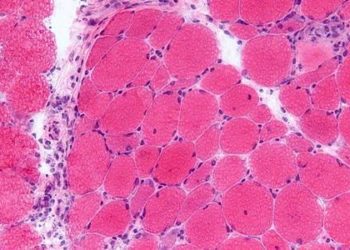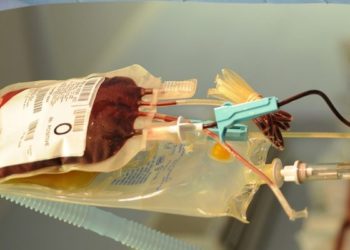Axatilimab reduces symptoms in patients with graft versus host disease
1. In this randomized controlled trial, axatilimab effectively managed symptoms in patients with recurrent or refractory graft versus host disease (GVHD).
2. Axatilimab was generally well-tolerated with manageable side effects.
Evidence Rating Level: 2 (Good)
Study Rundown: Chronic GVHD is a severe complication of allogenic hematopoietic stem cell transplantation that affects approximately half of transplant recipients. Chronic GVHD often manifests in multiple organs, with features of inflammation and fibrosis in the lungs, esophagus, joints, fascia, and skin that can progress to end-organ damage. Current standard treatments include corticosteroids and immunosuppressants. However, many patients may become resistant or refractory to such therapies, necessitating new therapy options. Colony stimulating factor 1 (CSF1) plays a key role in regulating macrophage and monocyte-mediated inflammation and fibrosis in chronic GVHD. As such, blocking CSF1 receptors with a monoclonal antibody, like axatilimab, offers an opportunity to reduce manifestations of chronic GVHD. The present trial investigated three doses of axatilimab as potential treatment options for reducing symptoms of GVHD in patients experiencing refractory or recurrent disease. Axatilimab showed an overall rapid and durable response, as measured by the NIH Consensus criteria. Patients in all three dosage groups saw meaningful reductions in chronic GVHD symptoms, as measured by the Lee Symptom Scale score. The treatment was generally well tolerated and consistent with that of immunosuppressive therapies. This study was limited by the lack of a control group, thus introducing the possibility of bias. Overall, axatilimab demonstrated potential as a treatment option for individuals with chronic recurrent or refractory GVHD.
Click here to read the study in NEJM
In-Depth [randomized controlled trial]: This phase two randomized trial assessed the efficacy and safety of different doses of axatilimab therapy in patients with chronic recurrent or refractory GVHD. Patients who were two years of age or older with active signs and symptoms of GVHD were eligible for this trial if they had previously received at least two lines of systemic therapy. A total of 241 patients were randomly assigned, in a 1:1:1 ratio, to receive axatilimab intravenously at three different doses every two weeks: 0.3mg/kg body weight (0.3mg dose group, n=80), 1mg/kg body weight (1mg dose group, n=81), or 3mg/kg body weight (3mg dose group, n=80). The primary outcome was the overall response, defined as a complete or partial response within the first six cycles after randomization. Organ-specific outcomes were evaluated and compared to baseline severity of chronic GVHD. The primary endpoint was met in all three dosage groups, with an overall response seen in 74% of patients in the 0.3mg dose group (95% Confidence Interval [CI], 63-83), 67% of patients in the 1mg dose group (95% CI, 55-77), and 50% of patients in the 3mg dose group (95% CI, 39-61). A reduction of more than five points on the Lee Symptom Scale was reported in 60% of the 0.3mg dose group patients, 69% of the 1mg dose group patients, and 41% of the 3mg dose group patients. Adverse effects associated with CSF1 receptor inhibition were dose-dependent, often transient, and asymptomatic. The incidence of infection associated with immune suppression did not differ from that of other chronic immunosuppressive therapies. Results from this study indicated that axatilimab was effective for many patients facing chronic recurrent or refractory chronic GVHD who did not have successful treatment with standard therapies.
Image: PD
©2024 2 Minute Medicine, Inc. All rights reserved. No works may be reproduced without expressed written consent from 2 Minute Medicine, Inc. Inquire about licensing here. No article should be construed as medical advice and is not intended as such by the authors or by 2 Minute Medicine, Inc.







